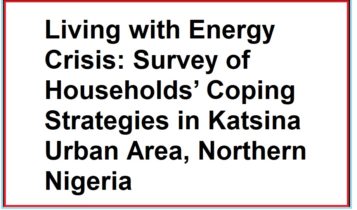Living with Energy Crisis: Survey of Households’ Coping Strategies in Katsina Urban Area, Northern Nigeria
Living with Energy Crisis: Survey of Households’ Coping Strategies in Katsina Urban Area, Northern Nigeria
Abstract
In sub-Saharan Africa (SSA) the energy sector is generally in crisis and demands are variably met with fossil-based, water-based, forest-based and renewable sources. When problems affect forest and water recourses (for example drought and land degradation), extraction/sales of fossil fuels (such as governance crises and international price fluctuations) or limited resources to acquire renewable sources, energy crisis tend to become aggravated. Land degradation is an important environmental problem in Nigeria, especially in northern part where prolonged drought and heavy land resources exploitation are very severe. Urban dwellers in the country meet their energy demands through variety of sources including grid-based electricity supply, off-grid personalised electricity installations, use of liquefied natural gas, wood and charcoal burning, renewable energy based, as well as use of kerosene-based stoves and lamps. The major ingredients for these energy sources are largely non-renewable, being mainly based on forest, water, solid minerals, oil and gas. The energy sector has been facing a lot of crises that have deprived a substantial part of the population from having access to energy.

The nature and effects of such crisis has been well documented but little research information exists on how people (especially urban dwellers) across much of SSA have been coping with it. Using qualitative interview data from local households in Katsina urban area of northern Nigeria, this study sets out to assess how urban dwellers cope with energy crisis. The results obtained revealed that about 90% of the households are connected to grid-based electrification but over majority (>87%) rely on wood-based (charcoal, firewood) sources, with about 47% relying on fossil-based (kerosene, natural gas, gasoline and diesel) and less than 5% relying on renewable (wind, solar and biofuel) sources. The main challenges faced in meeting energy demands include scarcity and high costs of fossil-based fuel sources, and wood and charcoal; erratic supply of grid-based electricity and disappearance of tree species from which to derive firewood and charcoal. The major coping strategies employed by the households include reduction in non-energy spending to free resources for meeting energy demands, reduced frequency of cooking, uses of candles, solar-powered lightning devices and solid wastes in domestic combustions; reduced frequency of ironing of clothes; increased efficiency in energy usage and reduced use of high energy consuming devices. Where electricity is available, it is used for lighting by most (>95%), but only few (<30%) use it for cooking and cooling. However, over 75% use candles (for lightning) and firewood (for cooking). Only 23% use liquefied gas (for cooking) while about 72% use gasoline and diesel to power generators and generate private/off-grid electricity. Only 2% use dry cell and car batteries, and solar, wind and biofuel systems. The major determinants of use of coping strategies are households’ low resource base, social-cultural considerations, technical complexity of the many hi-tech energy solutions and lack of incentives for the people to use energy conserving devices. Some suggestions have been made on how to enhance the coping capabilities of the households and ensure greater access to energy in the area.
Amina Ibrahim Inkani1* and SaniAbubakar Mashi2
1Department of Geography, Umaru Musa Yaradu’a University, PMB 2218, Katsina, Nigeria
2Department of Geography and Environmental Management, University of Abuja, PMB 117 Abuja, Nigeria
*correspondence (inkaniamina@gmail.com +234-80-65512021)
An Abstract of a Paper for Presentation at the Annual Conference of the Institute of African Studies and Research, Cairo University Egypt to be held between21st and 23rd May 2017 on African Studies in 70 years.
